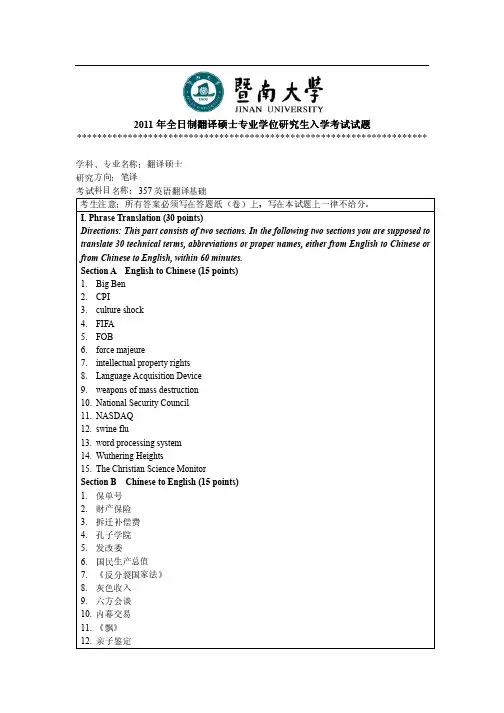广东工业大学2018年《357英语翻译基础》考研专业课真题试卷
- 格式:pdf
- 大小:983.11 KB
- 文档页数:4
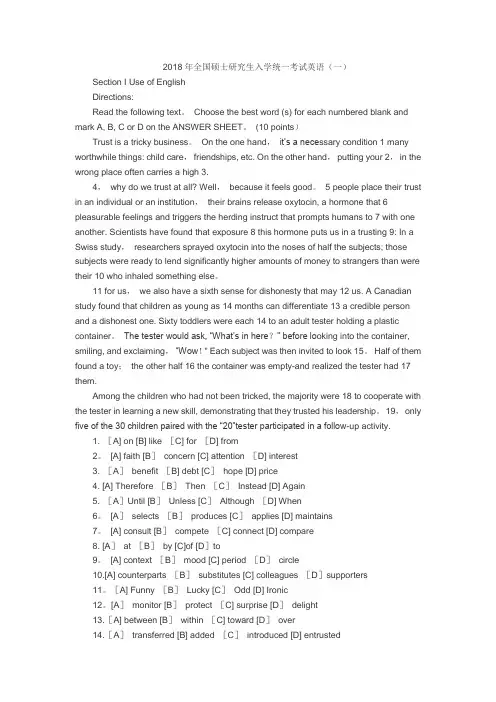
2018年全国硕士研究生入学统一考试英语(一)Section I Use of EnglishDirections:Read the following text。
Choose the best word (s) for each numbered blank and mark A, B, C or D on the ANSWER SHEET。
(10 points)Trust is a tricky business。
On the one hand,it’s a nece ssary condition 1 many worthwhile things: child care,friendships, etc. On the other hand,putting your 2,in the wrong place often carries a high 3.4,why do we trust at all? Well,because it feels good。
5 people place their trust in an individual or an institution,their brains release oxytocin, a hormone that 6 pleasurable feelings and triggers the herding instruct that prompts humans to 7 with one another. Scientists have found that exposure 8 this hormone puts us in a trusting 9: In a Swiss study,researchers sprayed oxytocin into the noses of half the subjects; those subjects were ready to lend significantly higher amounts of money to strangers than were their 10 who inhaled something else。
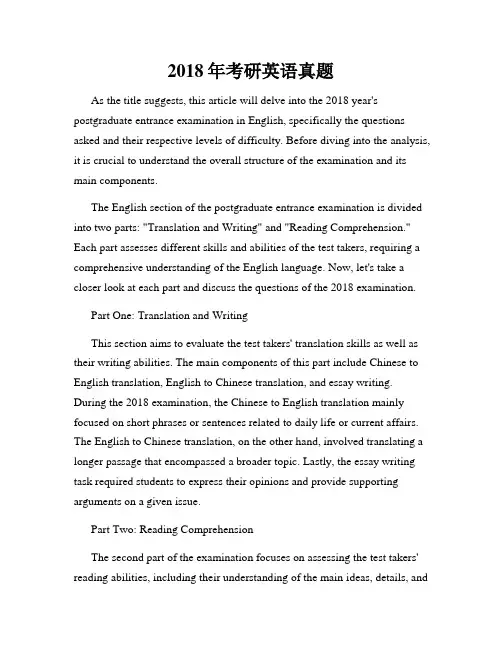
2018年考研英语真题As the title suggests, this article will delve into the 2018 year's postgraduate entrance examination in English, specifically the questions asked and their respective levels of difficulty. Before diving into the analysis, it is crucial to understand the overall structure of the examination and its main components.The English section of the postgraduate entrance examination is divided into two parts: "Translation and Writing" and "Reading Comprehension." Each part assesses different skills and abilities of the test takers, requiring a comprehensive understanding of the English language. Now, let's take a closer look at each part and discuss the questions of the 2018 examination.Part One: Translation and WritingThis section aims to evaluate the test takers' translation skills as well as their writing abilities. The main components of this part include Chinese to English translation, English to Chinese translation, and essay writing. During the 2018 examination, the Chinese to English translation mainly focused on short phrases or sentences related to daily life or current affairs. The English to Chinese translation, on the other hand, involved translating a longer passage that encompassed a broader topic. Lastly, the essay writing task required students to express their opinions and provide supporting arguments on a given issue.Part Two: Reading ComprehensionThe second part of the examination focuses on assessing the test takers' reading abilities, including their understanding of the main ideas, details, andlogical structure of the given passages. In 2018, the reading comprehension section consisted of three passages, each followed by several multiple-choice questions. The passages covered a wide range of topics, from social issues to scientific research, challenging the students' comprehension skills across various subjects.Analyzing the Difficulty of the 2018 ExaminationOverall, the 2018 English section of the postgraduate entrance examination was considered moderately challenging. The translation questions required a solid foundation of vocabulary and grammar, as well as a deep understanding of idiomatic expressions. The essay writing task tested the candidates' ability to articulate their thoughts in a clear and logical manner while presenting persuasive arguments. The reading comprehension questions demanded a keen eye for detail and the capability to grasp complex ideas within a limited time frame.In terms of difficulty, the translation questions were generally regarded as more challenging than the essay writing section. The short time given for translation tasks posed a particular challenge for test takers to accurately convey the original meaning while ensuring the natural flow of language. The essay writing, however, provided students with an opportunity to showcase their language proficiency and critical thinking skills, allowing for more creativity and personal insights.Regarding the reading comprehension section, the level of difficulty varied across the three passages. While some passages were relatively straightforward, others required a deeper understanding of specialized vocabulary and concepts. This disparity in difficulty ensured that a range ofabilities were tested, allowing for a fair assessment of the candidates' reading comprehension skills.ConclusionIn conclusion, the 2018 English section of the postgraduate entrance examination challenged test takers in various aspects of language proficiency. The translation and writing tasks demanded a strong grasp of vocabulary, grammar, and linguistic nuances. The reading comprehension section tested the students' ability to understand and analyze complex passages covering diverse topics.Preparing for the postgraduate entrance examination in English requires extensive practice in all areas of the language, from translation skills to essay writing and reading comprehension. By being exposed to a variety of topics and practicing under timed conditions, candidates can enhance their language abilities, improve their critical thinking skills, and increase their chances of success in the examination.。
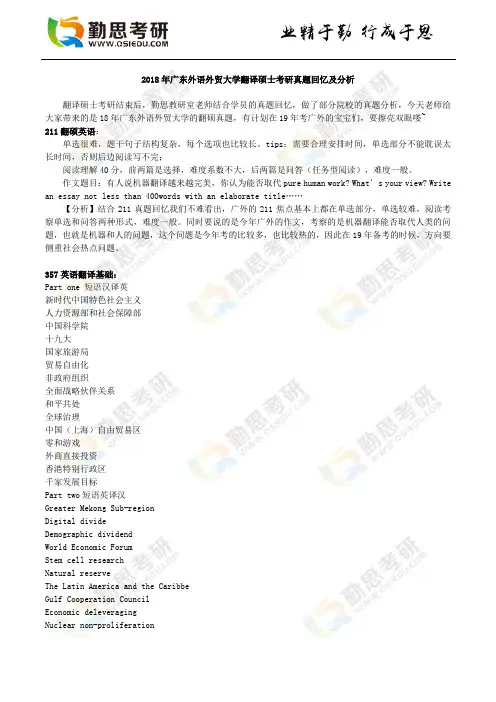
2018年广东外语外贸大学翻译硕士考研真题回忆及分析翻译硕士考研结束后,勤思教研室老师结合学员的真题回忆,做了部分院校的真题分析,今天老师给大家带来的是18年广东外语外贸大学的翻硕真题,有计划在19年考广外的宝宝们,要擦亮双眼喽~211翻硕英语:单选很难,题干句子结构复杂,每个选项也比较长。
tips:需要合理安排时间,单选部分不能耽误太长时间,否则后边阅读写不完;阅读理解40分,前两篇是选择,难度系数不大,后两篇是问答(任务型阅读),难度一般。
作文题目:有人说机器翻译越来越完美,你认为能否取代pure human work? What’s your view? Write an essay not less than 400words with an elaborate title……【分析】结合211真题回忆我们不难看出,广外的211焦点基本上都在单选部分,单选较难,阅读考察单选和问答两种形式,难度一般。
同时要说的是今年广外的作文,考察的是机器翻译能否取代人类的问题,也就是机器和人的问题,这个问题是今年考的比较多,也比较热的,因此在19年备考的时候,方向要侧重社会热点问题。
357英语翻译基础:Part one 短语汉译英新时代中国特色社会主义人力资源部和社会保障部中国科学院十九大国家旅游局贸易自由化非政府组织全面战略伙伴关系和平共处全球治理中国(上海)自由贸易区零和游戏外商直接投资香港特别行政区千家发展目标Part two短语英译汉Greater Mekong Sub-regionDigital divideDemographic dividendWorld Economic ForumStem cell researchNatural reserveThe Latin America and the CaribbeGulf Cooperation CouncilEconomic deleveragingNuclear non-proliferationFood and Agriculture OrganizationSpecial drawing rightsInternet of ThingsQuantitive easingEcological footprint段落翻译英译汉好像是选自The Genius of Science: A Portrait Gallery开头一句是:No one will understand history without continually relating long periods to the experiences of our own short life......只记得一句,广外一贯的风格初试不考文学翻译段落翻译汉译英从近年来的版画作品展来看,中国版画已经突破以往“小幅创作,难当大任”的固话印象,在形式语言推陈出新,创作主题多元探索,尤其是超大尺幅的创作等方面实现了跨越式发展,重大历史题材,现实题材领域涌现出一批优秀作品。
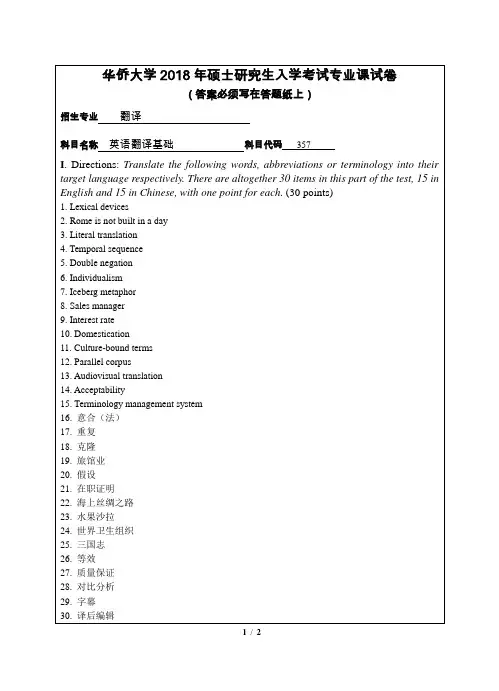
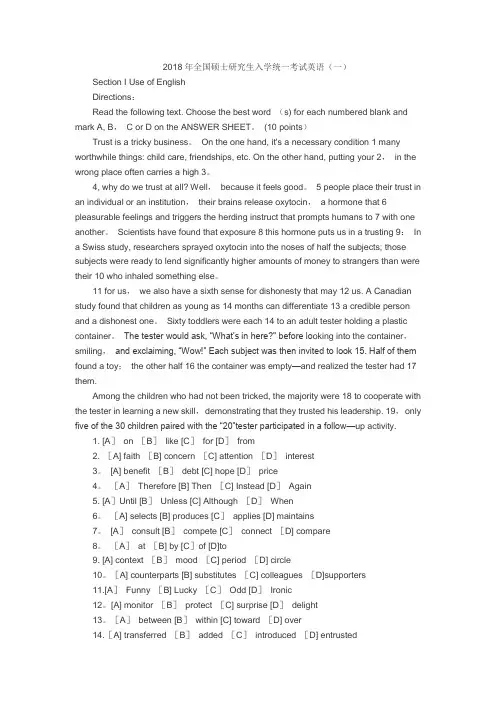
2018年全国硕士研究生入学统一考试英语(一)Section I Use of EnglishDirections:Read the following text. Choose the best word (s) for each numbered blank and mark A, B,C or D on the ANSWER SHEET。
(10 points)Trust is a tricky business。
On the one hand, it's a necessary condition 1 many worthwhile things: child care, friendships, etc. On the other hand, putting your 2,in the wrong place often carries a high 3。
4, why do we trust at all? Well,because it feels good。
5 people place their trust in an individual or an institution,their brains release oxytocin,a hormone that 6 pleasurable feelings and triggers the herding instruct that prompts humans to 7 with one another。
Scientists have found that exposure 8 this hormone puts us in a trusting 9:In a Swiss study, researchers sprayed oxytocin into the noses of half the subjects; those subjects were ready to lend significantly higher amounts of money to strangers than were their 10 who inhaled something else。
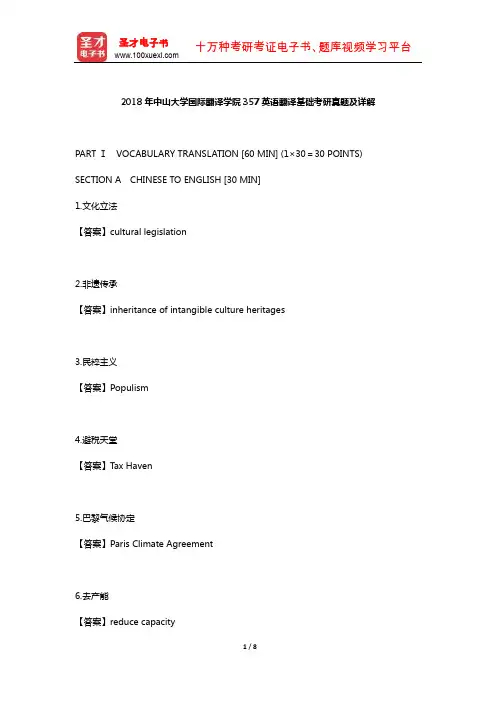
2018年中山大学国际翻译学院357英语翻译基础考研真题及详解PART ⅠVOCABULARY TRANSLATION [60 MIN] (1×30=30 POINTS) SECTION A CHINESE TO ENGLISH [30 MIN]1.文化立法【答案】cultural legislation2.非遗传承【答案】inheritance of intangible culture heritages3.民粹主义【答案】Populism4.避税天堂【答案】Tax Haven5.巴黎气候协定【答案】Paris Climate Agreement6.去产能【答案】reduce capacity7.共享单车【答案】bicycle sharing8.房产泡沫【答案】real estate bubble9.补偿贸易【答案】compensation trade10.移动支付【答案】mobile payment11.人工智能【答案】artificial intelligence(AI)12.去杠杆【答案】deleverage13.经济弱复苏【答案】weak economic recovery14.社会主义核心价值观【答案】socialist core values15.十九大【答案】the 19th National CongressSECTION B ENGLISH TO CHINESE [30 MIN] 1. Pivot to Asia【答案】重返亚太2. Mass shooting【答案】大规模枪击案3. Bit coin【答案】比特币4. Electoral college【答案】(美国)总统选举团5. Rust belt State【答案】铁锈地带国家6. Refugee Crisis【答案】难民危机7. Goldman Sachs【答案】高盛集团8. Infant industry【答案】幼稚产业9. Cremea【答案】克里米亚10. Communitarianism【答案】社群主义11. Malware【答案】恶意软件12. Deregulation of interest rate 【答案】利率市场化13. Emmanuel Macron【答案】埃马纽埃尔·马克龙14. Catalonia referendum【答案】加泰罗尼亚公投15. International Chamber of Commerce【答案】国际商会PART ⅡTRANSLATION [120 MIN] (2×60=120 POINTS)SECTION A CHINESE TO ENGLISH TRANSLATION [60 MIN]我第一次读到莫言,是他的《红高粱》,大约是在20世纪80年代末。

357
华南理工大学
2018年攻读硕士学位研究生入学考试试卷
(试卷上做答无效,请在答题纸上做答,试后本卷必须与答题纸一同交回)
科目名称:英语翻译基础
适用专业:英语笔译(专硕)
357
华南理工大学
2017年攻读硕士学位研究生入学考试试卷
(试卷上做答无效,请在答题纸上做答,试后本卷必须与答题纸一同交回)
科目名称:英语翻译基础
适用专业:英语笔译(专硕)
357
华南理工大学
2016年攻读硕士学位研究生入学考试试卷
(试卷上做答无效,请在答题纸上做答,试后本卷必须与答题纸一同交回)
科目名称:英语翻译基础
适用专业:英语笔译(专硕)。
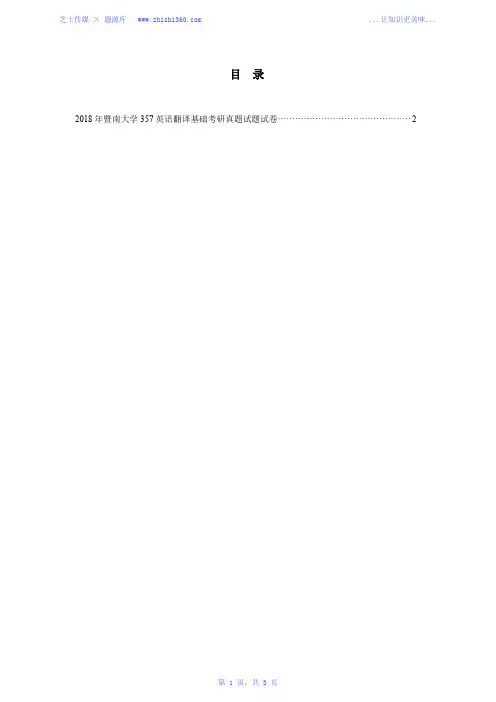
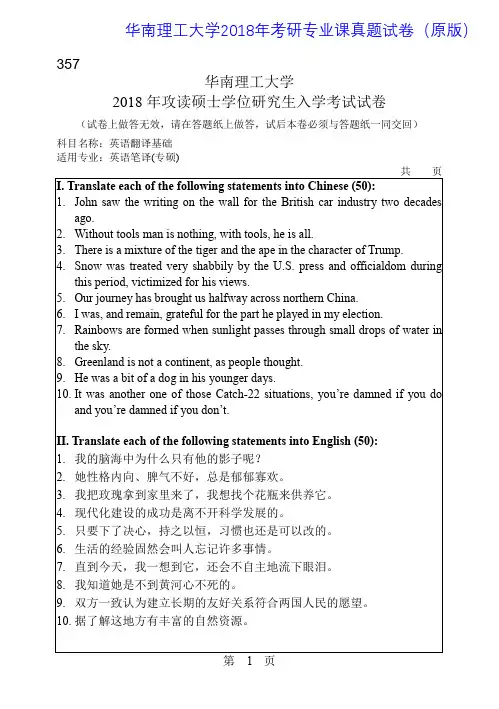
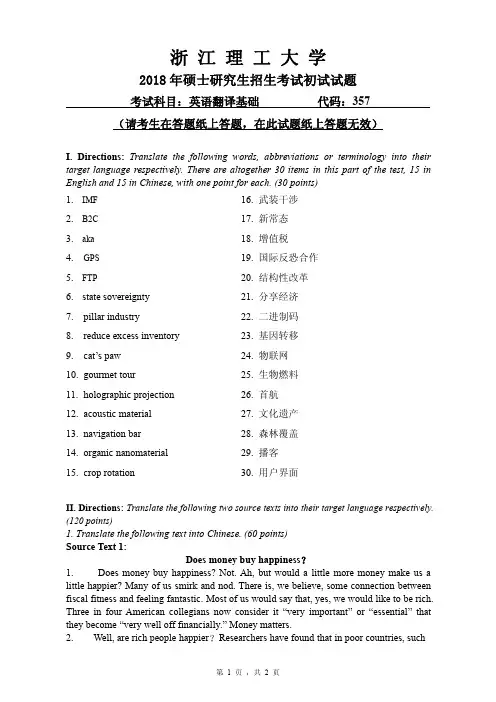
浙江理工大学2018年硕士研究生招生考试初试试题考试科目:英语翻译基础代码:357(请考生在答题纸上答题,在此试题纸上答题无效)I.Directions:Translate the following words,abbreviations or terminology into their target language respectively.There are altogether30items in this part of the test,15in English and15in Chinese,with one point for each.(30points)1.IMF16.武装干涉2.B2C17.新常态3.aka18.增值税4.GPS19.国际反恐合作5.FTP20.结构性改革6.state sovereignty21.分享经济7.pillar industry22.二进制码8.reduce excess inventory23.基因转移9.cat’s paw24.物联网10.gourmet tour25.生物燃料11.holographic projection26.首航12.acoustic material27.文化遗产13.navigation bar28.森林覆盖anic nanomaterial29.播客15.crop rotation30.用户界面II.Directions:Translate the following two source texts into their target language respectively. (120points)1.Translate the following text into Chinese.(60points)Source Text1:Does money buy happiness?1.Does money buy happiness?Not.Ah,but would a little more money make us a little happier?Many of us smirk and nod.There is,we believe,some connection between fiscal fitness and feeling fantastic.Most of us would say that,yes,we would like to be rich. Three in four American collegians now consider it“very important”or“essential”that they become“very well off financially.”Money matters.2.Well,are rich people happier?Researchers have found that in poor countries,suchas Bangladesh,being relatively well off does make for greater well-being.We need food, rest,shelter and social contact.3.But a surprising fact of life is that in countries where nearly everyone can afford life’s necessities,increasing affluence matters surprisingly little.The correlation between income and happiness is“surprisingly weak,”observed University of Michigan researcher Ronald Inglehart in one16-nation study of170,000people.Once comfortable,more money provides diminishing returns.The second piece of pie,or the second$100,000, never tastes as good as the first.4.Even lottery winners and the Forbes’100wealthiest Americans have expressed only slightly greater happiness than the average American.Making it big brings temporary joy.But in the long run wealth is like health:its utter absence can breed misery,but having it doesn’t guarantee happiness.Happiness seems less a matter of getting what we want than of wanting what we have.5.Has our happiness floated upward with the rising economic tide?Are we happier today than in1940,when two out of five homes lacked a shower or tub?When heat often meant feeding wood or coal into a furnace?When35percent of homes had no toilet?6.Actually,we are not.Since1957,the number of Americans who say they are“very happy”has declined from35to32percent.Meanwhile,the divorce rate has doubled,the teen suicide rate has nearly tripled,the violent crime rate has nearly quadrupled(even after the recent decline),and more people than ever(especially teens and young adults)are depressed.2.Translate the following text into English.(60points)Source Text2:大蒜的保健作用大蒜可能是你应当食用的最有利健康的食品。
